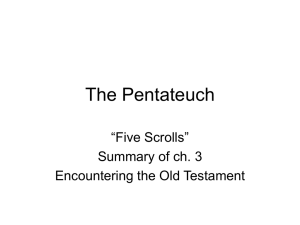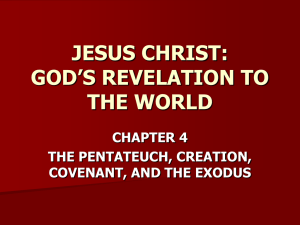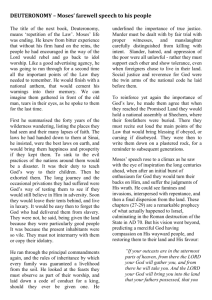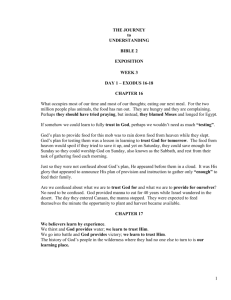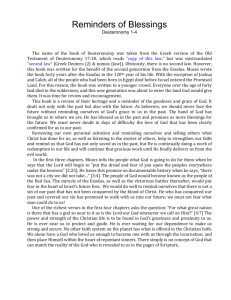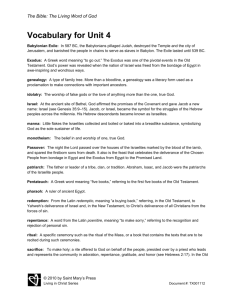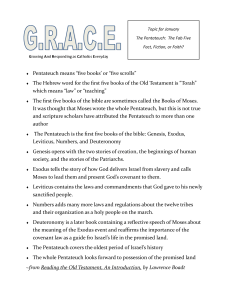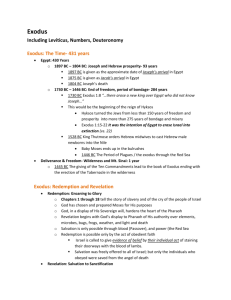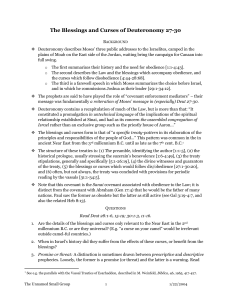The Five Books of Moses, The Pentateuch, The Torah
advertisement
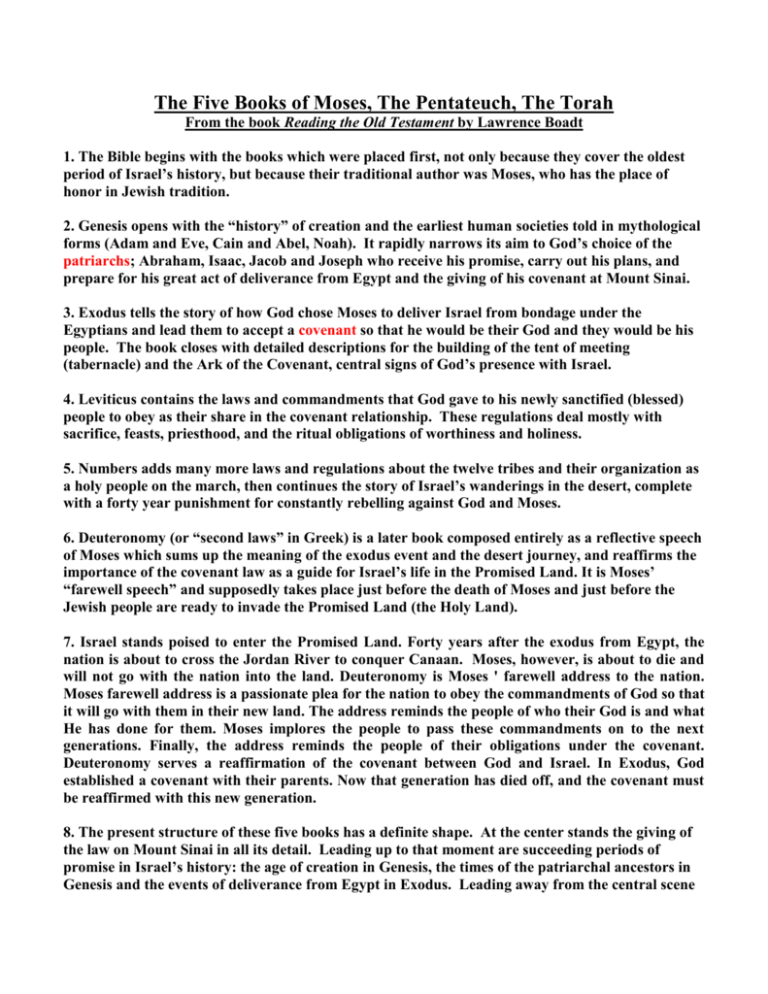
The Five Books of Moses, The Pentateuch, The Torah From the book Reading the Old Testament by Lawrence Boadt 1. The Bible begins with the books which were placed first, not only because they cover the oldest period of Israel’s history, but because their traditional author was Moses, who has the place of honor in Jewish tradition. 2. Genesis opens with the “history” of creation and the earliest human societies told in mythological forms (Adam and Eve, Cain and Abel, Noah). It rapidly narrows its aim to God’s choice of the patriarchs; Abraham, Isaac, Jacob and Joseph who receive his promise, carry out his plans, and prepare for his great act of deliverance from Egypt and the giving of his covenant at Mount Sinai. 3. Exodus tells the story of how God chose Moses to deliver Israel from bondage under the Egyptians and lead them to accept a covenant so that he would be their God and they would be his people. The book closes with detailed descriptions for the building of the tent of meeting (tabernacle) and the Ark of the Covenant, central signs of God’s presence with Israel. 4. Leviticus contains the laws and commandments that God gave to his newly sanctified (blessed) people to obey as their share in the covenant relationship. These regulations deal mostly with sacrifice, feasts, priesthood, and the ritual obligations of worthiness and holiness. 5. Numbers adds many more laws and regulations about the twelve tribes and their organization as a holy people on the march, then continues the story of Israel’s wanderings in the desert, complete with a forty year punishment for constantly rebelling against God and Moses. 6. Deuteronomy (or “second laws” in Greek) is a later book composed entirely as a reflective speech of Moses which sums up the meaning of the exodus event and the desert journey, and reaffirms the importance of the covenant law as a guide for Israel’s life in the Promised Land. It is Moses’ “farewell speech” and supposedly takes place just before the death of Moses and just before the Jewish people are ready to invade the Promised Land (the Holy Land). 7. Israel stands poised to enter the Promised Land. Forty years after the exodus from Egypt, the nation is about to cross the Jordan River to conquer Canaan. Moses, however, is about to die and will not go with the nation into the land. Deuteronomy is Moses ' farewell address to the nation. Moses farewell address is a passionate plea for the nation to obey the commandments of God so that it will go with them in their new land. The address reminds the people of who their God is and what He has done for them. Moses implores the people to pass these commandments on to the next generations. Finally, the address reminds the people of their obligations under the covenant. Deuteronomy serves a reaffirmation of the covenant between God and Israel. In Exodus, God established a covenant with their parents. Now that generation has died off, and the covenant must be reaffirmed with this new generation. 8. The present structure of these five books has a definite shape. At the center stands the giving of the law on Mount Sinai in all its detail. Leading up to that moment are succeeding periods of promise in Israel’s history: the age of creation in Genesis, the times of the patriarchal ancestors in Genesis and the events of deliverance from Egypt in Exodus. Leading away from the central scene on Mount Sinai which stretches across the Books of Exodus, Leviticus and Numbers, Israel continues the march toward the Promised Land, while Deuteronomy gives final guidance for the conquest and instructions on how Israel is to act in the land. 9. The whole first five books of the Torah, (the teaching) look forward to the possession of the Promised Land. Life in the land of Israel will form the basic backgrounds for the rest of the Old Testament story. The other books can be divided among three groupings - the history books from Joshua to Kings tell of the days of the judges and kings: the prophetic books speak of the divine challenges to Israel’s faithfulness: the writings, including wisdom books, psalms, and later histories, relate religion in everyday life, and becomes a constitution of Israel’s existence in the promised land – or outside of it, as the situation later develops. 10.The covenant combines God’s free offer of a special relationship and the Jewish people’s willing response in faith by agreeing to take on the obligations to worship and obey only this God, Yahweh. It forms a fundamental event that creates Israel as a people who are essentially united more by faith than by blood ties. It is a binding moment and sets the Hebrew Bible which records it apart from the rest of the Old Testament. For the Jews it is the most sacred part of the Bible; it is “the teaching” (Torah) par excellence, and the remainder of the canonical writings are really only an enrichment of its message or a commentary on living out more fully in Jewish history. Ten paragraphs – ten sentences – 30 points Four vocabulary words - 8 points Tell me in three words the main idea of the article (ten points)
